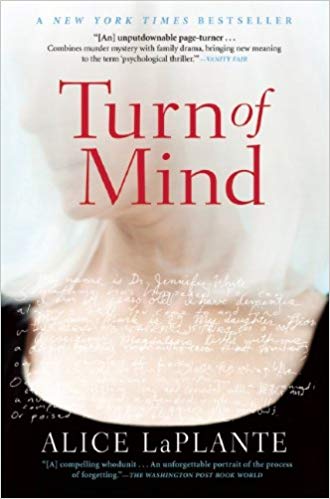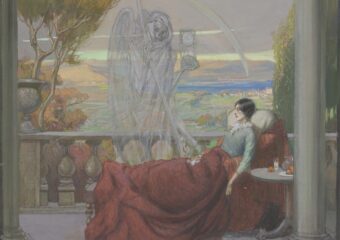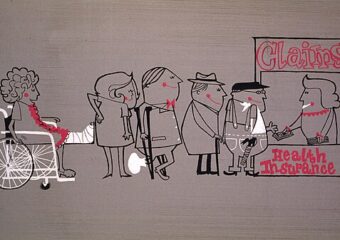People with dementia experience a deterioration in their mental and physical functions over time. The particular functions affected can vary as can the rate of deterioration. Biomedical texts typically characterize these changes in neuropsychiatric terms based on behavioral observations and clinical findings. At a certain stage of dementia, and not an advanced stage, the people with dementia cannot describe their experience in much detail if at all. Authors of literary fiction and nonfiction who bring characters and subjects with dementia into their stories have had to imagine what the experience must be like. These literary renderings can elaborate on the clinical descriptions such that they relate more to what people actually experience in their lives.
Here a classic biomedical description of dementia is compared to descriptions taken from a murder mystery in which the prime suspect has Alzheimer’s disease.
The Biomedical
From Harrison’s Principles of Internal Medicine, 21st edition, McGraw-Hill, 2022
In the middle stages of AD, the patient is unable to work, is easily lost and confused, and requires daily supervision. Language becomes impaired—first naming, then comprehension, and finally fluency. Word-finding difficulties and circumlocution can be evident in the early stages, even when formal testing demonstrates intact naming and fluency. Apraxia emerges, manifesting as trouble performing learned sequential motor tasks such as using utensils or appliances. Visuospatial deficits begin to interfere with dressing, eating, or even walking, and patients fail to solve simple puzzles or copy geometric figures. Simple calculations and clock reading become difficult in parallel.
Rabinovici GD, Seeley WW, Miller BL. Alzheimer’s Disease. In: Loscalzo J, Fauci A, Kasper D, Hauser S, Longo D, Jameson J. eds. Harrison’s Principles of Internal Medicine, 21e. McGraw Hill; 2022. Accessed October 12, 2023. https://accesspharmacy.mhmedical.com/content.aspx?bookid=3095§ionid=262997915
The Literary
From Turn of Mind, by Alice LaPlante, Atlantic Monthly Press, New York, 2009
In this fictional murder mystery, the prime suspect has Alzheimer’s disease. The prime suspect, a hand surgeon, is also the narrator for the book even when it’s in second-person and third-person. With this set up, the author was able to convey the effects of Alzheimer’s disease on communication and memory over time. Here are some excerpts from that refer to the experience. A review of the book is here.
That half state. Life in the shadows. As the neurofibrillary tangles proliferate, as the neuritic plaques harden, as synapses cease to fire and my mind rots out, I remain aware. An unanesthetized patient.
p. 8
Every death of every cell pricks me where I am most tender. And people I don’t know patronize me. They hug me. They attempt to hold my hand. They call me prepubescent nicknames: Jen, Jenny. I bitterly accept the fact that I am famous, beloved even, among strangers. A celebrity.
If I could see through this fog. Break through this heaviness of limbs and extremities. Every inhalation stabs. My hands limp in my lap. Pale and impotent, they used to wield shiny sharp things, lovely things with heft and weight that bestowed power.
p. 34
What is there to understand? I have a degenerative disease. There is no cure for that disease. That is the condition facing hundreds of thousands of people around the world.
p. 99
It started a while ago. Months. I noticed I was forgetting things. Little things, like where I’d put my keys or my wallet or the box of past I’d taken out of the pantry. Then these gaps. One minute I’d be in my office, the next in the Jewel frozen foods section with no recollection of how I’d got there. Then words starting to go. I was in the middle of surgery and I had to say, Give me that shiny thing that pinches and holds. I saw my residents exchanging glances. Humiliating.
p. 135
View of caregiver:
p.103
Well, for you a lot of things have been reopened. Old questions, old wounds, old joys and sorrows. It’s like going into the basement and finding all the old boxes of stuff you’d meant to give to Goodwill open and overflowing. Things you thought you’d put away for good. Now you have to go through everything again.
Thoughts when Alzheimer’s character urged to scan her memory:
p. 128
Surprising things. Not what I expected. No weddings, no funerals. No births, no deaths. Small moments. My cat, Binky, up a tree when I was five. A pair of my underwear blowing off the clothesline in the wind and into Billy Plenner’s yard next door when I was in seventh grade—something that he never let me forget. Finding a five-dollar bill on the floor of the roller–skating rink and feeling rich. Rolling in the grass in Lincoln Park with Fiona, nine years old.
View of son:
p. 137
It’s not just the keys, Mom, says the boy. It’s the agitation. The aggression. The wandering. Your inability to use the bathroom, take care of basic sanitary needs. Refusing your medications.
View of friend, who says:
p. 114
The end of my marriage is nothing compared to the end of our friendship–if that’s what you want to call it. It’s enough to want to burn the bridge and leave you on the other side. Too many good-byes lie ahead. How many times have you had to endure the death of James? How many times will I have to say good-bye to you, only to have you reappear like some newly risen Christ. Yes, better to burn the bridge and prevent it from being crossed and recrossed until my heart gives out from sheer exhaustion.
It is a face I have seen before. That’s what I am reduced to now. No more names. Just characteristics, if they are idiosyncratic enough, and knowing whether a face is familiar or unfamiliar… And those are not absolute categories. I can be looking at a face that I have decided is unfamiliar only to have its features shift and reveal a visage that is not only known but beloved.
p. 160
I study the face of the girl walking me to the dining room. My prosopagnosia, my inability to distinguish one face from another, is getting worse. I cannot hold on to features, so when a person is in front of me, I study them. To try to do what every six–month–old child is capable of doing: separate the known from the unknown.
p. 145
As termites eating away at my emotions. Nibbling at the edges at first, then going deeper until they destroy. Robbing me of my chance to say good-bye. You think, Tomorrow, or next week. You think you still have time.
p.175
But all the while the termites are doing their work, and before you know it, it’s no longer possible to feel the loss honestly or spontaneously. Most people start acting at that point. I’m not capable of that. Hence, no funeral. Hence, no tears.
As third-person narrator at the end:
p. 297 and p. 305
It’s the visions that make the waiting possible. And what visions! In glorious color, all senses activated. Fields of blooming, perfumed flowers, gleaming sterile operating rooms ready for cutting, beloved faces that she can reach out and caress, and soft hands that caress back. Heavenly music.
Each day slower than the one before it. Each day more words disappear. The visions alone endure. The playground. The white Communion dress. Playing kickball in the streets. James burning toast. The babies.



